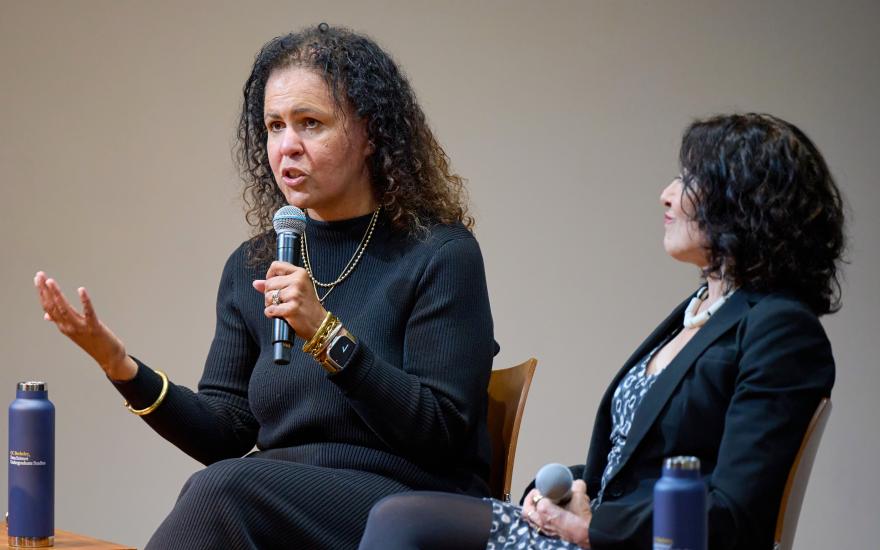Rebecca Gloyer left her first El Camino College computer science class feeling discouraged. She had already been nervous that she didn’t have a background in the subject, but when she walked into the classroom she realized she was also the only girl.
“If I fell behind, then I'd reinforce the stereotype that girls don't code or girls aren't good at math,” Gloyer said. “I didn't want to reinforce that, obviously, [so] it was really stressful going into every class being like, ‘I have to be on top of it. I have to be on top of it.’”
She received the highest grade for the course that semester. She’d later become the president of the Los Angeles, Calif., community college’s computer science club and a student advocate for the establishment of a data science certificate. But, working as a computer science tutor for her school, she still ran into students who requested male instead of female tutors, making her feel like she didn’t belong in STEM.
Gloyer is far from the only woman to experience isolation in these fields. According to a National Center for Science and Engineering Statistics report, while women made up half of STEM related bachelor’s degree recipients nationwide in 2021, only 26 percent of computer science and math undergraduate degrees were female. When Gloyer transferred to UC Berkeley in the fall, her experience changed. Here, women made up 44% of all data science majors that semester. Gloyer sees that in her classes.
“There's such a difference between being the only girl in your computer science class and there being many,” said Gloyer, who is a junior now in her second semester at Berkeley. “I have a lot more camaraderie, I guess you could say, with fellow women in STEM. I'm like, ‘You know what? We’ve got to stick together. We can't be dealing with this.’”
Increasing access to data science
Gloyer initially thought she wanted to be a business and economics double major when she started at El Camino College. But after a semester of online courses during the pandemic, she found it wasn’t a fit. So she searched online for STEM majors that intersected with business and discovered data science. When she found that her community college was one of the few to already offer courses in this nascent field – thanks in part to the California Alliance for Data Science Education facilitated by Berkeley – she decided to see if it was a fit.
She loved it. She enjoyed solving puzzles. She found computer science and coding engaging, and statistics gave her confidence. From there, she got even more involved. She tutored and even became El Camino College’s senator of mathematical sciences in student government.
She also watched and supported the growth of data science education and awareness at the community college, including through the launch of a “Data Science Day,” where she encouraged others to try it out, especially women. This promotion was fun for her, but also a kind of mission.
“Something that I'm really passionate about in general is opening data science to everyone.”
“Something that I'm really passionate about in general is opening data science to everyone,” said Gloyer, adding that data skills are historically concentrated among privileged groups, despite the disproportionate power that gives them to “control how society functions.”
“A lot of the people that are historically oppressed often have community college as their option,” she said. “Having the opportunity for them to have the data science [education there] rather than them having to go to, for example, Berkeley, for data science really opens up the windows of opportunity for them to then be able to develop those skills that are so important for data literacy” and civic engagement.
At Berkeley and beyond
Today, Gloyer is getting settled at Berkeley. She’s trying out different clubs and programs and advocating for women’s safety, disability rights and other social change issues. She’s also enjoying her classes and – through initiatives like Berkeley’s one-credit fall data science transfer orientation course – finding her community.
She’s not totally sure how she wants to use data science after college. She’s still interested in business, but she’s also grown fascinated by urban studies and sustainability. She wants to make sure that, regardless of her topic, she is making a difference in the world. Whatever she decides, she believes her data science skills and time at Berkeley will help. She’s grateful and proud that she’s made it this far.
“If I didn't have the opportunity to take data science classes in community college, I absolutely would not be studying data science right now."
“If I didn't have the opportunity to take data science classes in community college, I absolutely would not be studying data science right now because it'd be such a leap of faith for me to say, ‘I'm good at math. I'm good at computer science. I'm definitely going to be good at data science,’” Gloyer said.
“So that's why I really like that Data 8 [the introductory data science course] was offered at my community college,” she said. “Because otherwise I just wouldn't be here."


